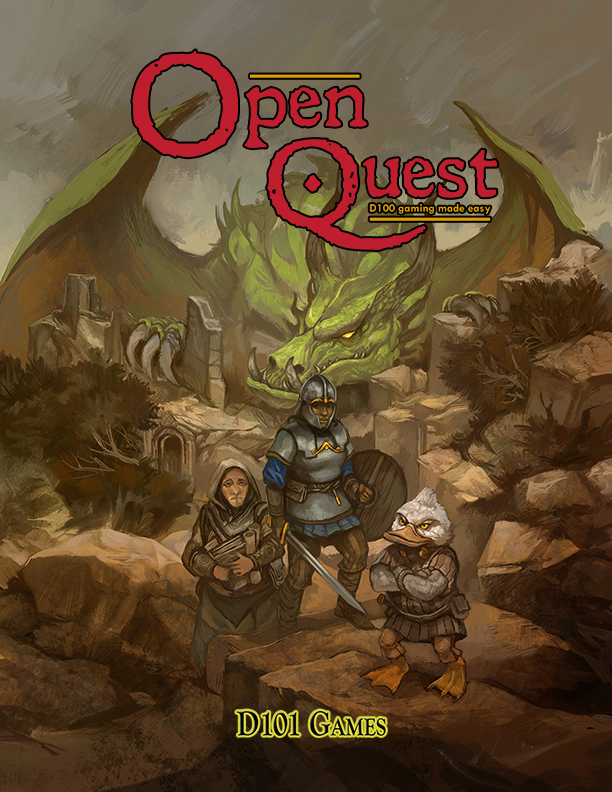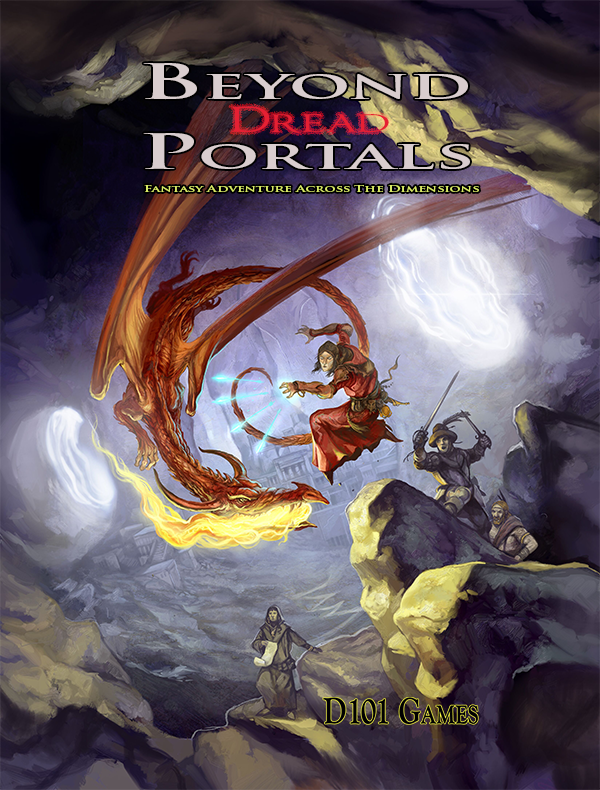A guest post from Paul Mitchener (Liminal, Age of Arthur, Hunters of Alexandria, Tombs of the Necromancer to name a few author credits) explaining why he wrote our multi-dimensional Fantasy Adventure game, Beyond Dread Portals. Take it away Mitch!
For me, it’s not usually a selling point when I hear that something was over 20 years in the making. So I’ll just say that Beyond Dread Portals is based on ideas I was playing with, and a fantasy campaign I ran about 20 years ago. The campaign was human-centric, without the usual elves and dwarves, world-hopping, and started the player characters off at high level, letting them rub against powerful enemies and make big changes to the setting.
As is the way of such things, I enjoyed it and then moved on to other things. But periodically, I went back to it, sketching more things out in the setting, and started playing more with the mechanical side of things. It still wasn’t something I was aiming to publish, but it was something I was writing for fun.
It was only more recently, though still years ago now, that I started taking Beyond Dread Portals more seriously, thinking of it as something for other people to enjoy. This meant feedback, tightening up the writing, scrapping things which didn’t fit, and overall thinking about the design. Best of all, it meant more play, this time with a view to playtesting. It felt very natural to speak to Newt about this, as someone who likes and has published things of a similar nature and knows about tight game design.
Early feedback from Newt led to something simpler and better at the system end of things, and better presented and explained from the setting point of view. Best of all, he was engaged with it, clearly enjoying the setting and the concepts.
This is drifting away from the question, though… why did I write Beyond Dread Portals as something for publication? The short answer is that I needed to! But more specifically, it started to feel like it offered something a little different. Specifically.
- Human-centric world-hopping fantasy. World-hopping is nothing new, but being more human-centric is rarer when combined with high magic world-hopping fantasy.
- Military expansion of an empire and all its ills, while the core of the empire is thoroughly rotten.
- Exploration of different places and cultures.
- Political intrigue with competing factions and player characters absolutely changes the setting as a result.
As for the game system, it was a fun chance to design broadly in the OSR space, with all of its creativity, while still doing absolutely my own thing. Beyond Dread Portals began as an AD&D 2e setting but became something fresh and new. The inspiration there – things which effectively gave me permission – included rules sets which changed things to fit a concept, such as Newt’s own Crypts and Things – and systems I think of as post-OSR, which weren’t at all clones of the older D&D books, but changed things, sometimes radically. I won’t give a full ludography here, but some things I wanted from the design were.
- A broadly familiar feel to the rules, as expected from the base. There are ability scores, classes, and levels – I’ve kept what I wanted for the game, and changed other things.
- Rules elements that fit the setting along with simplicity. There are three broad classes – warrior, expert, and magician – and setting-appropriate abilities which customise these classes.
- Less of an emphasis on looting and fighting, but more on exploration and intrigue. The combat rules are solid and streamlined, broadly as expected from the basis, but not everything is about combat. For instance, there are experience rewards for seeing new places, and firm guidance for the use of social abilities.
Taking the DIY ethos of OSR gaming on board, Beyond Dread Portals is my D&D, with my sensibilities. I can’t wait to see it out there so that it’s no longer mine but ours.






 Although
Although 
